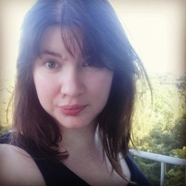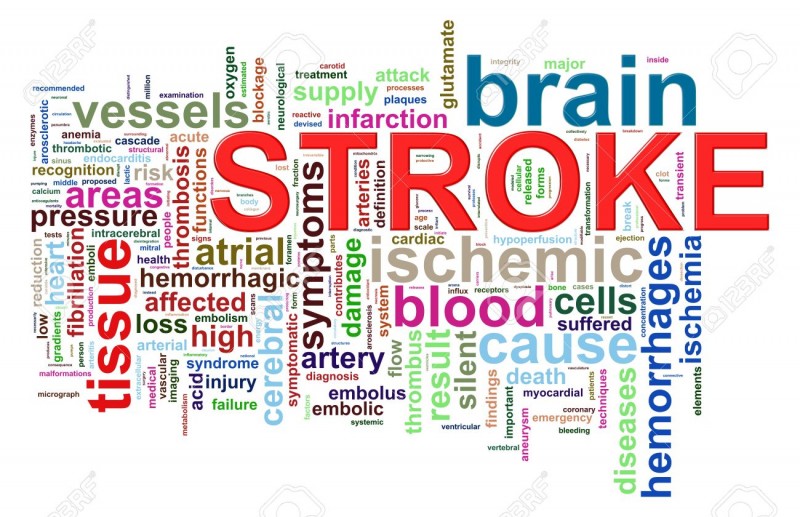Written by Alison Turner
Kasia’s Facebook page is filled with the subjects you might expect a 28 year old woman to be interested in – Zumba, cooking, travel and concerns about money. But you’ll also see references to spasticity, hemiparesis, research and, frequently, hospital, because Kasia has survived two strokes. Stroke does happen to young people.
A journalism graduate, living in the Polish city of Szczecin, she writes with an endearing blend of generosity and youthful determination. It’s not surprising that her Polish blog, lewaczka.pl, which she updates 2 or 3 times a week, attracts an average of 200 readers a day. Occasionally, she also writes entries for the English version of her blog, stroketales.com. Her posts are sincere and frank, sharing her own experiences, but also highlighting the trials of her readers, who contact her for support. We spoke via Skype on a Sunday evening in February 2017.

Kasia, a young stroke survivor and blogger
“I get mails from the carers, or older stroke survivors, but mainly young readers. They email me about all kinds of things. How did I manage to make peace with the illness? How do I manage with the fear? That’s the first thing – management of fear or anxiety.” Kasia says her readers fear the future, and they fear having another stroke. “I have one friend, my reader who became a friend – she says very frequently that her anxiety is so much that she can’t sleep. And I can’t help these people but I can share what I think about it”.
She began the blog while recovering from her first stroke at the age of 25. “The moment I got back my cell phone, and I was strong enough I started to search on internet. I didn’t have apashia, luckily. I started to search internet and I found out that there is no hope for me. I will be disabled for life. Stroke is something which turns your life over, and your life is over, actually. That’s the data you can find on Polish websites. And, when my life after stroke turned out to be not that bad, I thought that it’s worth sharing. The first thing was about this hope we don’t have. I wish I could have read something like this when I was in hospital because hope is important for us.”
The blog is also a rehabilitation tool for Kasia. Her journalism training has taught her to thoroughly research her subject, and this knowledge has helped her discover other treatment options. And she can maintain her writing skills. “I don’t feel confident any more. But it’s a good way of training. I hope that one day I will write again, well enough to earn a living. I’m not sure if it will happen but it’s a good training. I do it on a daily basis and probably without the blog, I wouldn’t.” The strokes have affected her memory and concentration. “I don’t remember all the grammar rules I learned by heart, like where to put the comma – in Polish it’s crazy! And, you know, my style got worse. Sometimes I struggle to find proper words. I see that I have problems with focusing attention which affects my reading even more than writing. But it’s all like one thing when you try to write. I still have a bit hemiparesis. I can operate my hand, but with precise movements like writing, the keyboard, it’s not that easy.”
In common with many stroke survivors, Kasia is also concerned about how the strokes may have affected her employability. She has an intern position writing two articles a week for another website, which is not about stroke. “I would be extremely insecure if it would come to job searching. I had only one interview after the first stroke when I felt strong enough. It was a disaster. I was stressed. When I’m stressed, I’m speaking more bad, it was disaster. I’d love to find a job in journalism, but it’s extremely difficult in Poland, even for healthy people. If someone asks me, ‘Why didn’t you work for past 2 years?’ it would be hard enough to answer.”
Kasia is aware that stroke recovery can be a lonely process. Using her online presence, she has created a space where experiences can be shared and talked through. “I always answer. Always, always – every single mail or Facebook message is answered. I figured that if I’m having a stroke blog, people who contact me, they need it. So, it would be just mean to leave them for themselves. I think this honesty is worth sharing. And I have new friends. I see from the feedback that my experience is not unusual, there are many stroke survivors, some young stroke survivors, and everyone has to make his life in this experience. And I think it’s very, very precious to know that people around are also sick, also struggle, sometimes will be big problems, sometimes with smaller.”
She would like to take the role a step further and has considered establishing a support group for stroke survivors. “In my city we don’t have support group. I have brilliant friends who care for me, but, you know, after two years, it’s difficult to keep in contact. But I love them, I know they love me. They try to support, but the contact is different. I think that people around can know what happens to you, but they wouldn’t understand it fully. And it’s not their fault. It’s not our fault. But the experience is different.” She had a very positive experience with the UK-based support group for young stroke survivors, Different Strokes. “Sharing experience is great – that’s why I’m thinking about establishing something like this in Poland. But I’m afraid of duties, like papers, accounting, where I get money from… So, still I’m just reading about it, and thinking would I manage that by myself because I don’t know anyone to operate with me here in Szczecin.”
When I ask Kasia about the future, and if she makes plans, she responds with her trademark disarming honesty. “It is difficult. Because I know that you can plan something, like plan going home for Christmas and instead you are on stroke ward in hospital and it changes. I take small steps to improving my health and my wellbeing. I have more dreams than plans. And I think that dreams sooner or later will happen, will become true. I am a fighter, but I don’t believe in winning. I’m a born pessimist, so I fight, fight, fight, but not believing that I will succeed. But it would be great to make a difference for people like us.” In the shorter term, though, Kasia will spend her Sunday evening with her inspiration – Dr Gregory House, the character from the TV drama who solves medical mysteries. “I’m watching it again and searching for the answers, or praying for my own Dr House. Yeah, Greg is waiting for me.”





